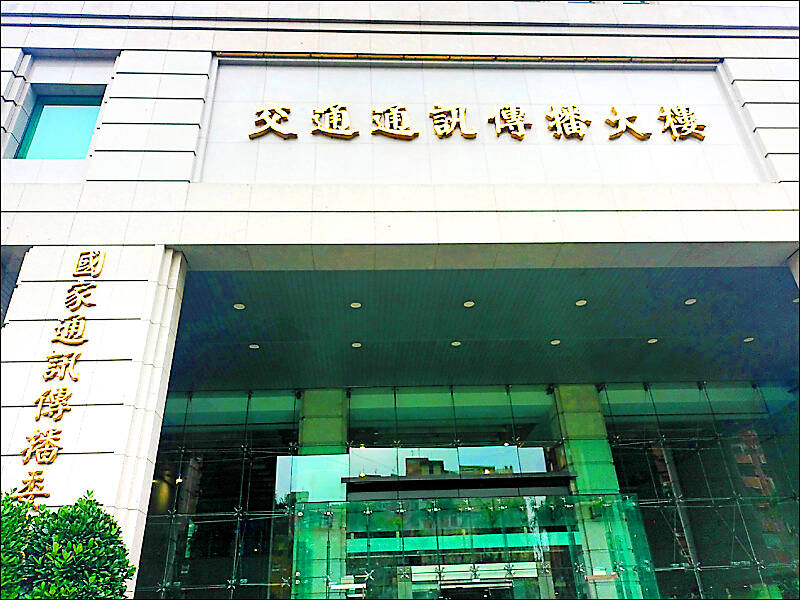Nearly 99 percent of Taiwanese over the age of 16 made voice-over Internet protocol (VoIP) calls last year, with 62.8 minutes being the average call duration, the National Communications Commission said in its 2023 Communications Market Report.
The report, published yesterday, showed that 99.1 percent of respondents used the Line app and 49.2 percent used Facebook Messenger.
Taiwanese made use of Internet-enabled calls an average of 7.33 hours per week, significantly more than their cellphone use of 1.62 hours per week, it said.

Photo: Ting Yi, Taipei Times
More than 50 percent of Taiwanese only have mobile phones as their household communications device, and 25 percent switched from 4G to 5G services, the report said.
Meanwhile, 68.3 percent subscribed to unlimited data services for their mobile devices, which remained the most popular service package in Taiwan, it said.
Users also reported a higher rate of satisfaction with the coverage and quality of cellphone services compared with the previous year, the NCC said.
Cable television, which commanded a 61.7 percent market share, was still favored by television watchers over 16 years of age, it said.
Chunghwa Telecom’s MOD and over-the-top media services accounted for 13.1 percent and 12.9 percent respectively of the market, while terrestrial television had 9.5 percent, it said.
About 72.6 percent of respondents reported using television as their main source of information, while 41.5 percent made use of Web-based aggregation platforms including Yahoo, Google and Line Today, it said.
Furthermore, 38.3 percent of respondents used instant messenger services such as Facebook or Line for information, the NCC said.
Last year, Taiwan’s telecoms sector posted revenue of NT$285.1 billion (US$9.09 billion) after reaping the returns of investments in digital infrastructure and a spike in demand for media during the COVID-19 pandemic, marking the second consecutive year of growth, it said.
The number of fixed broadband Internet accounts grew to 6.55 million, it said.

Taiwan has received more than US$70 million in royalties as of the end of last year from developing the F-16V jet as countries worldwide purchase or upgrade to this popular model, government and military officials said on Saturday. Taiwan funded the development of the F-16V jet and ended up the sole investor as other countries withdrew from the program. Now the F-16V is increasingly popular and countries must pay Taiwan a percentage in royalties when they purchase new F-16V aircraft or upgrade older F-16 models. The next five years are expected to be the peak for these royalties, with Taiwan potentially earning

STAY IN YOUR LANE: As the US and Israel attack Iran, the ministry has warned China not to overstep by including Taiwanese citizens in its evacuation orders The Ministry of Foreign Affairs (MOFA) yesterday rebuked a statement by China’s embassy in Israel that it would evacuate Taiwanese holders of Chinese travel documents from Israel amid the latter’s escalating conflict with Iran. Tensions have risen across the Middle East in the wake of US and Israeli airstrikes on Iran beginning Saturday. China subsequently issued an evacuation notice for its citizens. In a news release, the Chinese embassy in Israel said holders of “Taiwan compatriot permits (台胞證)” issued to Taiwanese nationals by Chinese authorities for travel to China — could register for evacuation to Egypt. In Taipei, the ministry yesterday said Taiwan

Taiwan is awaiting official notification from the US regarding the status of the Agreement on Reciprocal Trade (ART) after the US Supreme Court ruled US President Donald Trump's global tariffs unconstitutional. Speaking to reporters before a legislative hearing today, Premier Cho Jung-tai (卓榮泰) said that Taiwan's negotiation team remains focused on ensuring that the bilateral trade deal remains intact despite the legal challenge to Trump's tariff policy. "The US has pledged to notify its trade partners once the subsequent administrative and legal processes are finalized, and that certainly includes Taiwan," Cho said when asked about opposition parties’ doubts that the ART was

If China chose to invade Taiwan tomorrow, it would only have to sever three undersea fiber-optic cable clusters to cause a data blackout, Jason Hsu (許毓仁), a senior fellow at the Hudson Institute and former Chinese Nationalist Party (KMT) legislator, told a US security panel yesterday. In a Taiwan contingency, cable disruption would be one of the earliest preinvasion actions and the signal that escalation had begun, he said, adding that Taiwan’s current cable repair capabilities are insufficient. The US-China Economic and Security Review Commission (USCC) yesterday held a hearing on US-China Competition Under the Sea, with Hsu speaking on